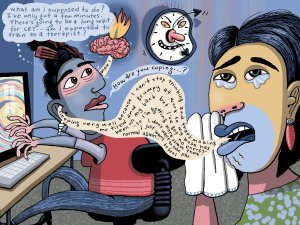A range of approaches is needed to manage mental health presentations. In this article, specialist GP Sophie Jadwiga Ball describes two tools that can be employed within a GP consultation and provides the evidence-based theory behind their use. She also presents numerous examples to demonstrate how you can apply these tools in practice
Promoting independence in ageing: How you can best support your older patients
Promoting independence in ageing: How you can best support your older patients

For those aged 80 and over living in the community, half fall each year. Of those, 50% will fall a second time in the future.2
Most older adults prefer to remain in their homes as they age, which underscores the high premium they place on their independence.1
This independence is not only a preference but also a crucial component contributing to the mental health and wellbeing of seniors. The fear of losing their independence and being transferred into an aged care residential facility outweighs other concerns for many.1
By staying in their own familiar home environment, older adults maintain their sense of freedom, and are better able to preserve their identity. Seniors living at home enjoy their privacy and maintain control over their lives, fostering feelings of purpose, accomplishment, and self-esteem.
Indeed, the benefits of home living extend beyond the individual to their social networks, fostering connections with family, friends, and the community - essential sources of social support.
However, independent living is not without its risks.
For those seniors who cherish their independence, falls, heart problems and respiratory issues can pose significant risks, with falls and fall-related injuries being particularly prevalent. Approximately one in three seniors aged 65 years or older living in the community experiences a fall at least once a year, and for those aged 80 and over living in the community, half fall each year. Of those, 50% will fall a second time in the future.2
Falls pose a severe health risk that could lead to the partial or complete loss of independence. Half of the seniors hospitalised due to fall-related injuries are discharged to an aged care facility.2
Moreover, the long period spent on the floor following a fall (termed 'long lie-time') can lead to serious health complications, increased hospitalisation rates and transitions to hospital and long-term care.3
The psychological impact of falls, including the fear of falling again, can lead to activity avoidance, strength loss, decreased agility, and balance, thereby escalating the risk of future falls.
So how can you support your patients and suggest appropriate precautions to manage their circumstances, while still helping them maintain their independence?
Two-thirds of older adults are open to employing assistive technologies that can enhance their ability to live independently.1
As a healthcare provider, you can bolster the independence of your older patients at home and in the community by referring them for a St John Medical Alarm.
Medical alarms (personal emergency response systems) provide a potential solution to preserving the wellbeing and independence of seniors who live at home, by enabling timely intervention during a health-related event like a fall, cardiac issue, or respiratory disorder. Timely intervention is crucial to minimise hospital admissions and limit the necessity for long-term aged residential care.
Research has shown that medical alarm use can decrease mortality rates and hospital admissions and reduce inpatient days for seniors living in the community,4,5 potentially lowering the likelihood of losing independence.
While it is impossible for you to constantly safeguard your patients, seniors in your care can return home with the reassurance of having access to help around the clock if needed, courtesy of a St John Medical Alarm. This gives them the confidence to lead a fulfilling, independent life, and to stay at home for longer.
A St John Medical Alarm offers 24/7 response and is the only medical alarm that connects directly to Hato Hone St John. Your patients have access to a FREE TRIAL, and can be referred simply through your Practice Management System via Healthlink or ERMS.
For more information go to stjohnalarms.org.nz/hcp
References: 1. Aging in place in America. Research Study. PositiveAging Sourcebook. 2018. 2. Soriano TA, et al. Clin Interv Aging. 2007;2(4):545-554. 3 Fleming J. BMJ 2008;337:a2227. 4. Roush RE, et al. South Med J. 1995;88(9):917-22. 5. Bernstein M. Manag Care Q. 2000;8(1):38-43.



